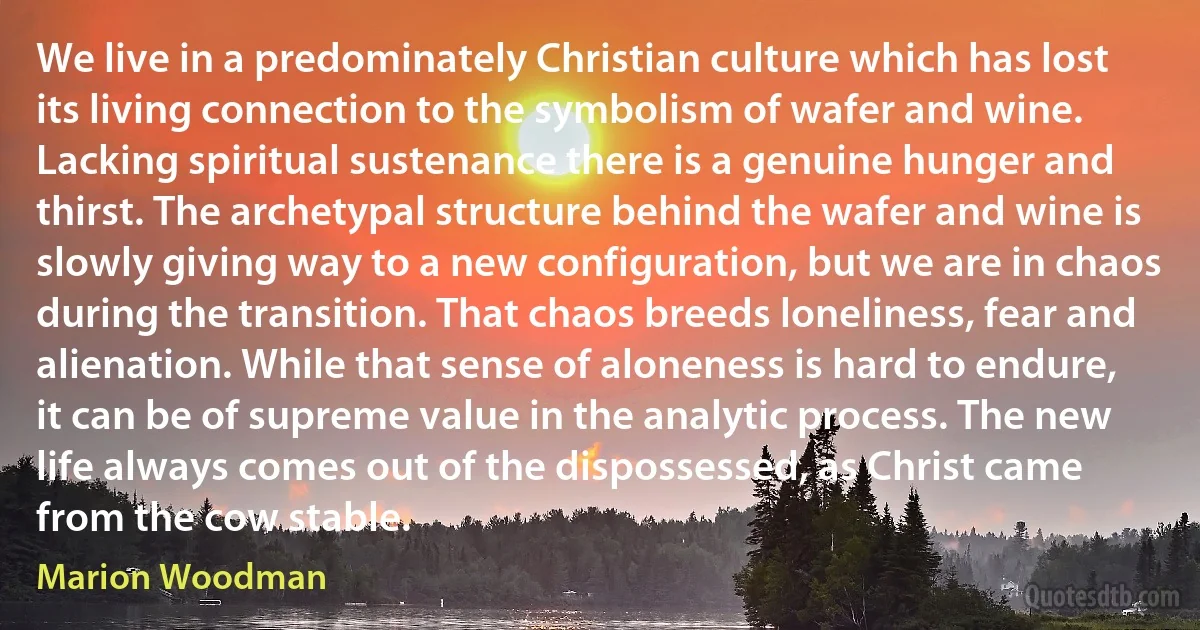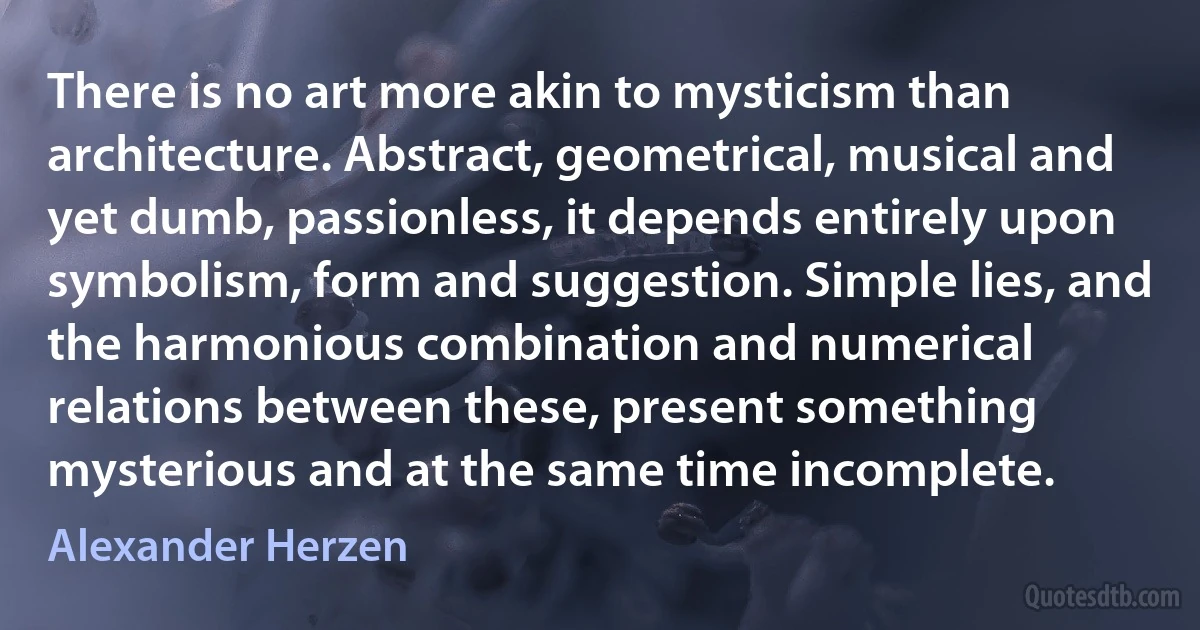Symbolism Quotes - page 3
It's all right to talk about "long white robes over yonder," in all of its symbolism. But ultimately people want some suits and dresses and shoes to wear down here. It's all right to talk about "streets flowing with milk and honey," but God has commanded us to be concerned about the slums down here, and his children who can't eat three square meals a day. It's all right to talk about the new Jerusalem, but one day, God's preacher must talk about the New York, the new Atlanta, the new Philadelphia, the new Los Angeles, the new Memphis, Tennessee. This is what we have to do.

Martin Luther King Jr.
Today we know that on the sub-atomic level the fate of an electron or a whole atom is not determined by its past. But this discovery has not led to any basically new departure in the philosophy of nature, only to a state of bewildered embarrassment, a further retreat of physics into a language of even more abstract symbolism. Yet if causality has broken down and events are not rigidly governed by the pushes and pressures of the past, may they not be influenced in some manner by the "pull" of the future-which is a manner of saying that "purpose" may be a concrete physical factor in the evolution of the universe, both on the organic and unorganic levels. In the relativistic cosmos, gravitation is a result of the curvature and creases in space which continually tend to straighten themselves out-which, as Whittaker remarked, "is a statement so completely teleological that it certainly would have delighted the hearts of the schoolmen."

Arthur Koestler
There is no need in these mathematical days to defend the use of symbolism. It is regarded by many schools of modern thought as the only safe form of language. Wittgenstein treats symbols as something more than conventional signs, and regards them as corresponding in some way to the reality to which they refer. He would probably accept Gurdjieff's dictum that:
Symbols not only transmit knowledge but show the way to it.
Even though other thinkers deny any objective reference to symbols, no one questions that symbolism has a power beyond that of ordinary language. It is different with the language of myth. This is despised by superficial thinkers, but the greatest philosophers have known its value.

John G. Bennett
The process which the Kabbalists described as the emanation of divine energy and divine light was also characterized as the unfolding of the divine language. This gives rise to a deep-seated parallelism between the two most important kinds of symbolism used by the Kabbalists to communicate their ideas. They speak of attributes and of spheres of light; but in the same context they speak also of divine names and the letters of which they are composed. From the very beginnings of Kabbalistic doctrine these two manners of speaking appear side by side.

Gershom Scholem
We can now return to the distinction between language and symbolism. A symbol is language and yet not language. A mathematical or logical or any other kind of symbol is invented to serve a purpose purely scientific; it is supposed to have no emotional expressiveness whatever. But when once a particular symbolism has been taken into use and mastered, it reacquires the emotional expressiveness of language proper. Every mathematician knows this. At the same time, the emotions which mathematicians find expressed in their symbols are not emotions in general, they are the peculiar emotions belonging to mathematical thinking.

R. G. Collingwood
Language in its original imaginative form maybe said to have expressiveness, but no meaning. About such language we cannot distinguish between what the speaker says and what he means... Language in its intellectualized form has both expressiveness and meaning. As language, it expressed a certain emotion. As symbolism, it refers beyond that emotion to the thought whose emotional charge it is... The progressive intellectualization of language, its progressive conversion by the work of grammar and logic into a scientific symbolism, thus represents not a progressive drying-up of emotion, but its progressive articulation and specialization. We are not getting away from an emotional atmosphere into a dry, rational atmosphere; we are acquiring new emotions and new means of expressing them.

R. G. Collingwood
The unnaturalness of mathematical symbolism is attested to by history. The algebra of the Egyptians, the Babylonians, the Greeks, the Hindus, and the Arabs was what is commonly called rhetorical algebra. ...on the whole they used ordinary rhetoric to describe their mathematical work. Symbolism is a relatively modern invention of the sixteenth and seventeenth centuries...

Morris Kline
There comes a point where individual mythology and universal mythology are identical. In this context it is clear that there can be no concern with symbolism and description, memories, misty impressions, of childhood, pictoricism, sentimentalism: all this must be absolutely excluded. So must every hedonistic repetition of arguments that have already been exhausted, since the man who continues to trifle with myths that have already been discovered is an aesthete, and worse.

Piero Manzoni
The chief innovator of symbolism in algebra was François Viète... an amateur in the sense that his professional life was devoted to the law... John Wallis... says that Viète, in denoting a class of numbers by a letter, followed the custom of lawyers who discussed legal cases by using arbitrary names [for the litigants]... and later the abbreviations... and still more briefly A, B, and C. Actually, letters had been used occasionally by the Greek Diophantus and by the Hindus. However, in these cases letters were confined to designating a fixed unknown number, powers of that number, and some operations. Viète recognized that a more extensive use of letters, and, in particular, the use of letters to denote classes of numbers, would permit the development of a new kind of mathematics; this he called logistica speciosa in distinction from logistica numerosa.

Morris Kline
I share the conviction held by many others that the movement of thought called "symbolism" is of great significance. Not only does this movement cut across the traditional lines of division among philosophers, but it coordinates in a remarkable way the work of linguists, sociologists, psychologists, anthropologists, and biologists, in so far as their work connects with the topic of mind. In the degree that the symbolic movement is significant, a work which develops systematically the basis of the movement, and at the same time applies this analysis to the topic of mind and to certain basic philosophical problems, can at least claim to be an important contribution to critical thought. Whether the claim is substantiated depends, of course, on the quality of the work itself.

Charles W. Morris
By the late Nineties, we had become a more visual nation. Big-money taste moved to global standards - new architecture, design and show-off contemporary art. The Sloane domestic aesthetic - symmetry, class symbolism and brown furniture - became as unfashionable as it had been hot in the early Eighties.

Peter York



